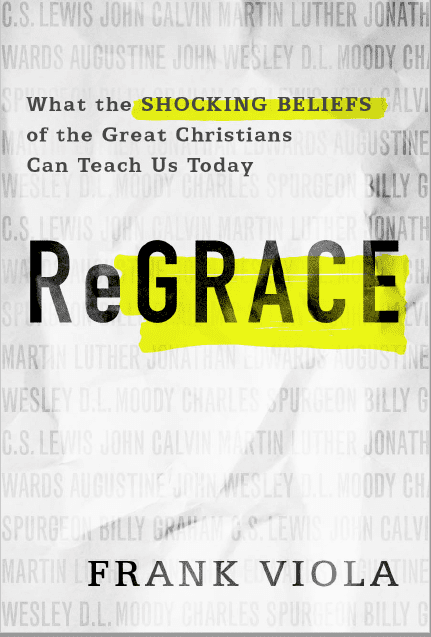What follows is an excerpt from Frank Viola’s new book – ReGrace: What the Shocking Beliefs of the Great Christians Can Teach Us Today. The endnotes which contain first-hand sources are not included in the excerpt.
WARNING: BEFORE GOING FURTHER, READ THIS FIRST
1) Some of the so-called shocking beliefs that I cover in ReGrace are beliefs that I myself agree with. Others I find abhorrent.
Consequently, just because a shocking belief is listed doesn’t reveal how I personally feel about it.
It simply means that many evangelical Christians will find the belief to be shocking (at worst) or peculiar (at best).
Therefore, to those of you who are inclined to finish this book and proudly throw your chest out saying, “Good grief, I wasn’t shocked by any of those beliefs!” remember three things:
You missed the point of the book; each person I feature had people who believed they were heretics during their day; and every one of them still have people raking them over the coals because of their viewpoints.
2) While I disagree with a number of beliefs that each person I feature held, I have respect for each of them. In fact, I cannot tie the laces of their shoes.
Each individual was remarkable in his own right. I realize this means that people who don’t like Calvin, Lewis, Wesley, Augustine, and so forth will be turned off by that statement.
And some may misuse this book as a frontal attack on each person it covers, completely missing the boat on those chapters and the intent of this volume.
Finally, remember, the point of this book is NOT to highlight what our spiritual forefathers believed. It’s simply that they all had imperfect views. For that reason, let’s have more grace and civility whenever we disagree with each other over theology and politics.
The book explains practically how to disagree – even strongly – in a Christlike manner without getting down in the mud and engaging in fleshly, carnal behavior over a diverging viewpoint held by a fellow Christian.
For if the “heroes” of the faith didn’t possess immaculate perception, than the same is true for every child of God today – including you.
—
Read Excerpt Now
The Shocking Beliefs of Jonathan Edwards
It takes God a long time to get us to stop thinking that unless everyone sees things exactly as we do, they must be wrong. That is never God’s view.
~ Oswald Chambers
Jonathan Edwards is a legend—a hero to many. Although the Yale-educated Calvinist theologian/philosopher lived in the eighteenth century, many who embrace Reformed theology give Edwards rock-star status.
The ubiquitous “Jonathan Edwards is my homeboy” T-shirts and coffee mugs are glaring examples. (I’m sorry, but neither the publisher nor I will be selling those.)
Historians regard Edwards to be the theologian of the First Great Awakening (while George Whitefield was its promoter).1
….
Even so, some American Christians venerate Edwards with almost cultlike regard. Thus any critique of his views is taken by some to be on a par with blaspheming the Holy Spirit.
So let me be clear: I, Frank Viola, believe that Jonathan Edwards was an incredible man whom God greatly used.
(If you’re a die-hard Edwards fan, reread that sentence please.)
Every Westerner who paid attention in history class knows Edwards from his infamous sermon, “Sinners in the Hands of an Angry God.”
What’s fascinating about this is that, according to the historical accounts, Edwards didn’t preach that sermon, he read it, as was his usual custom. And he wasn’t yelling when he did.5
In light of that introduction, the following views held by Edwards will be met with either shock or surprise by many Christians today.
1) Edwards believed that being a slave owner was not incompatible with being a follower of Jesus.
While Edwards was an advocate of Native American rights and denounced the transatlantic slave trade, he himself was a slave owner. Granted, Edwards believed that all humans were created equal by God and that slaves should be treated with respect.6
Many, if not most, of today’s evangelicals view slavery to be among the greatest evils in history. For “America’s greatest theologian” to own slaves is, well, shocking, even if he was simply acting in accordance with the times. Edwards was part of the aristocratic elite stratum of his society.
As one writer put it,
To expect Edwards to oppose slavery amidst the conflicts with the French and Native Americans would be akin to expecting soldiers to contribute to cancer research during a world war. It would be a good thing to do, but it probably wouldn’t rank among the most pressing concerns to the soldier. So it was with Edwards. Edwards the man was inescapably a man of his time—an aristocratic, revival focused, British patriot. Those were his blinders.7
This point sobers popular notions that Edwards always interpreted Scripture correctly, when in reality, he was influenced by the culture of his day in his understanding of Scripture.
The fact that one of America’s greatest theologians owned slaves is a testament to the fact that no human—however great they may be—sees every angle of everything.
2) Edwards believed that the office of the papacy was the Antichrist.
Apologies to the Roman Catholic Church, but despite his impressive mental acumen, Edwards actually believed this.
While a number of conservative evangelicals have been raised on this idea, most evangelical and mainstream Christians find it aberrant.
One writer states, “Edwards concluded that we can be certain that the Antichrist had embodied himself in the Roman Papacy.”8
3) Edwards believed that God hates sinners worse than you hate poison.
Edwards used intense imagery of eternally suffering in hell as a form of evangelism.
By contrast, many evangelical preachers today use more “polite” methods of evangelism, including appeals to become a Christian so one can reach their maximum potential.
Edwards’s description of painful eternal torment will be shocking to many modern Christians.
This is from his “Sinners in the Hands of an Angry God” sermon:
The God that holds you over the pit of hell, much as one holds a spider, or some loathsome insect, over the fire, abhors you, and is dreadfully provoked; his wrath towards you burns like fire; he looks upon you as worthy of nothing else, but to be cast into the fire; he is of purer eyes than to bear to have you in his sight; you are ten thousand times so abominable in his eyes, as the most hateful venomous serpent is in ours. You have offended him infinitely more than ever a stubborn rebel did his prince: and yet it is nothing but his hand that holds you from falling into the fire every moment: it is ascribed to nothing else, that you did not go to hell the last night; that you was suffered to awake again in this world, after you closed your eyes to sleep; and there is no other reason to be given, why you have not dropped into hell since you arose in the morning, but that God’s hand has held you up: there is no other reason to be given why you have not gone to hell, since you have sat here in the house of God, provoking his pure eyes by your sinful wicked manner of attending his solemn worship: yea, there is nothing else that is to be given as a reason why you do not this very moment drop down into hell.9
Whether you agree with this piece of prose or not, the ideas—and the language—are a first-class shocker for most modern Christians.10
—
The above is a short excerpt from ReGrace with the endnotes removed. There’s much more on Edwards and his views in the book.
To order the book, go to ReGrace: What the Shocking Beliefs of the Great Christians Can Teach Us Today.
Here is the Back Cover Description:
The church is tired of seeing Christians act ungraciously toward one another when they disagree. Social media has added to the carnage. Christians routinely block each other on Facebook because of doctrinal disagreements. The world watches the blood-letting, and the Christian witness is tarnished.
But what if every Christian discovered that their favorite teacher in church history had blind spots and held to some false–and even shocking–views?
Bestselling author Frank Viola argues that this simple awareness will soften Christians when they interact with each other in the face of theological disagreements.
In ReGrace, he uncovers some of the shocking beliefs held by faith giants like C.S. Lewis, Luther, Calvin, Moody, Spurgeon, Wesley, Graham, and Augustine–not to downgrade or dismiss them, but to show that even “the greats” in church history didn’t get everything right.
Knowing that the heroes of our faith sometimes got it wrong will empower us to treat our fellow Christians with grace rather than disdain whenever we disagree over theology.



















